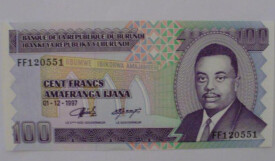蒲隆地法郎
蒲隆地共和國流通的貨幣
蒲隆地共和國流通的貨幣,簡稱布朗
| 面值 | 主色調 | 正面 | 背面 |
| 500 蒲隆地法郎 | 橘黃色 | 鱷魚、徽章、國旗、咖啡樹 | 蒲隆地地圖、坦葛尼喀湖上的船 |
| 1000 蒲隆地法郎 | 綠色 | 鳥、國徽、國旗、牛 | 蒲隆地地圖、香蕉樹 |
| 2000 蒲隆地法郎 | 紫色 | 羚羊,徽章,國旗,菠蘿 | 蒲隆地地圖,農田實地考察 |
| 5000 蒲隆地法郎 | 藍色 | 水牛,徽章,國旗,舞者鼓 | 蒲隆地地圖,景觀 |
| 10000 蒲隆地法郎 | 黃色 | 河馬,徽章,國旗,蒲隆地民族獨立英雄,第二任蒲隆地總理蒲隆地王子Rwagasore(1932-1961),梅爾基奧爾·恩達達耶總統(1953-1993) | 蒲隆地地圖,植物 |
| 面值 | 正面 | 背面 |
| 100 蒲隆地法郎 | 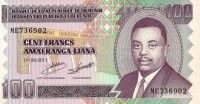 蒲隆地法郎 | |
| 500 蒲隆地法郎 | 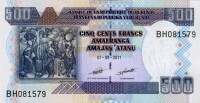 蒲隆地法郎 | 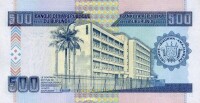 蒲隆地法郎 |
| 1000蒲隆地法郎 | 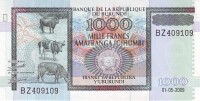 蒲隆地法郎 | 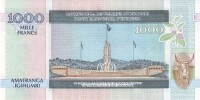 蒲隆地法郎 |
| 2000蒲隆地法郎 |  蒲隆地法郎 |  蒲隆地法郎 |
| 5000蒲隆地法郎 |  蒲隆地法郎 |  蒲隆地法郎 |
| 10000蒲隆地法郎 |  蒲隆地法郎 |  蒲隆地法郎 |
| 面值 | 正面 | 背面 |
| 500 蒲隆地法郎 | 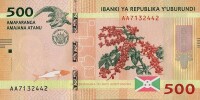 蒲隆地法郎 | 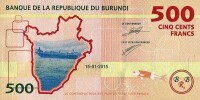 蒲隆地法郎 |
| 1000蒲隆地法郎 | 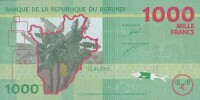 蒲隆地法郎 | |
| 2000蒲隆地法郎 | 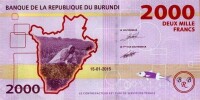 蒲隆地法郎 | |
| 5000蒲隆地法郎 |  蒲隆地法郎 | |
| 10000蒲隆地法郎 | 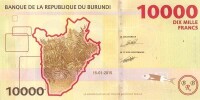 蒲隆地法郎 |
| 面值 | 正面 | 背面 |
| 500蒲隆地法郎 |  蒲隆地法郎 |  蒲隆地法郎 |
| 2000蒲隆地法郎 |  蒲隆地法郎 |  蒲隆地法郎 |
| 5000蒲隆地法郎 |  蒲隆地法郎 |  蒲隆地法郎 |
| 面值 | 正面 | 背面 |
| 1蒲隆地法郎 | 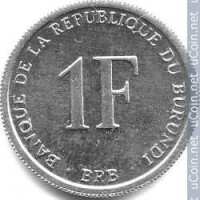 蒲隆地法郎 | 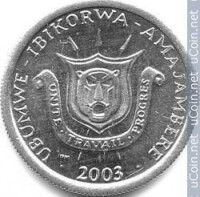 蒲隆地法郎 |
| 5蒲隆地法郎 | 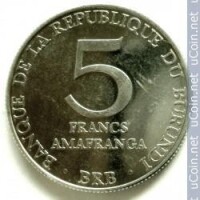 蒲隆地法郎 | 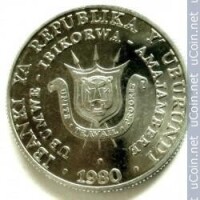 蒲隆地法郎 |
| 10蒲隆地法郎 | 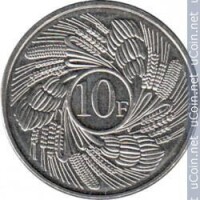 蒲隆地法郎 | 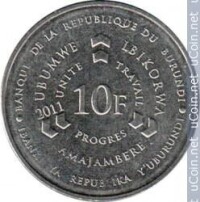 蒲隆地法郎 |
| 50蒲隆地法郎 | 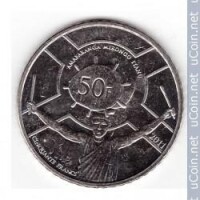 蒲隆地法郎 | 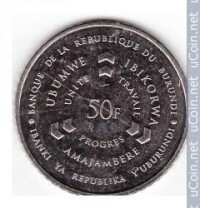 蒲隆地法郎 |
國徽:
中繪一金色獅子頭,盾徽背後交叉豎著三把矛。下端的白色綬帶上用法文寫著“團結、勞動、進步”。
國旗:
國家名稱:蒲隆地共和國
國家中文簡稱: 蒲隆地
國家英文名稱: The Republic of Burundi
所屬洲: 非洲
面積: 27834平方千米
首都: 布瓊布拉
首都英文名稱: Bujumbura
【簡況及歷史】
位於非洲中東部赤道南側的內陸國。
17世紀前,以放牧為生的圖西人到此,建立了封建國,對當地胡圖人進行統治。1890年成為德屬東非的一部分。一次大戰中由比利時接管。1922年成為比利時委任統治地。1946年聯合國通過決議,將布交由比利時“託管”。1962年7月1日宣布獨立,成立蒲隆地王國。1966年11月28日,成立蒲隆地共和國。
The history of the Burundi franc
Burundi was a part of German East Africa from 1890 until the Belgians occupied it in 1916, Burundi became part of Belgian controlled trust territory of Ruanda-Urundi. Burundi became an autonomous territory in 1961, gained independence as an independent kingdom in 1962, and finally became a republic in 1966.
During German times, the German East African rupie circulated until 1916. After Belgium’s occupation of Burundi, the Belgian Congo franc circulated throughout Burundi. The Belgian territories of Congo, Rwanda and Burundi all used the same currency until 1960 when Congo left the currency union at which time the Banque d’Emission du Rwanda et du Burundi was established to issue banknotes. The Rwanda-Burundi franc was established at par with the Belgian franc. In 1964 the Banque du Royaume du Burundi was established and the new Kingdom of Burundi began issuing its own franc notes. In 1966 the role of issuing the national currency was taken over by the Banque de la Republique du Burundi, who has held that responsibility since.
The Burundi franc is divided into 100 centimes although since the currencies inception in 1964 no coin have been issued in centimes due to the low value. The currency’s ISO 4217 code is BIF, in Burundi prices are written using “FBu” after the amount i.e. 100 FBu is 100 francs.
Coins have been issued in denominations of 1, 5, and 10 FBu., although they are seldom if never used anymore due to their low value. Banknotes are currently issued in the following denominations, 10, 20, 50, 100, 500, 1000, 2000, 5000 and 10 000 francs.
